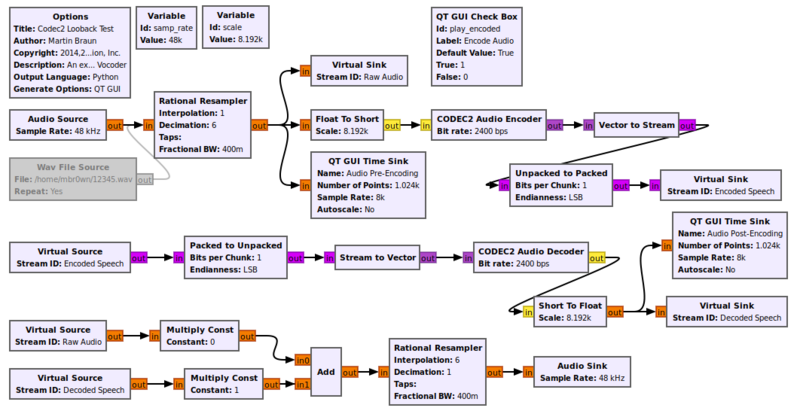Stream to Vector: Difference between revisions
Jump to navigation
Jump to search
(Created page with "Category:Block Docs Category:Stub Docs This is the template for the "Page-per-block Docs". This first section should describe what the block...") |
|||
| (One intermediate revision by one other user not shown) | |||
| Line 1: | Line 1: | ||
[[Category:Block Docs]] | [[Category:Block Docs]] | ||
Convert a stream of items into a stream of vectors containing Num Items | |||
The input stream can itself be of vectors. | |||
== Parameters == | == Parameters == | ||
; | ; Num items | ||
: | : Number of consecutive input items to concatenate into one output vector. | ||
; | ; Vec Length | ||
: | : Length of the input vector. The output vector is of length Vec Length * Num items. | ||
== Example Flowgraph == | == Example Flowgraph == | ||
This flowgraph can be found at [https://github.com/gnuradio/gnuradio/blob/master/gr-vocoder/examples/loopback-codec2.grc] | |||
[[File:Loopback_codec2_fg.png|800px]] | |||
== Source Files == | == Source Files == | ||
; C++ files | ; C++ files | ||
: [https://github.com/gnuradio/gnuradio | : [https://github.com/gnuradio/gnuradio/blob/master/gr-blocks/lib/stream_to_vector_impl.cc] | ||
; Header files | ; Header files | ||
: [https://github.com/gnuradio/gnuradio | : [https://github.com/gnuradio/gnuradio/blob/master/gr-blocks/lib/stream_to_vector_impl.h] | ||
; Public header files | ; Public header files | ||
: [https://github.com/gnuradio/gnuradio | : [https://github.com/gnuradio/gnuradio/blob/master/gr-blocks/include/gnuradio/blocks/stream_to_vector.h] | ||
; Block definition | ; Block definition | ||
: [https://github.com/gnuradio/gnuradio | : [https://github.com/gnuradio/gnuradio/blob/master/gr-blocks/grc/blocks_stream_to_vector.block.yml] | ||
Latest revision as of 02:18, 10 December 2020
Convert a stream of items into a stream of vectors containing Num Items
The input stream can itself be of vectors.
Parameters
- Num items
- Number of consecutive input items to concatenate into one output vector.
- Vec Length
- Length of the input vector. The output vector is of length Vec Length * Num items.
Example Flowgraph
This flowgraph can be found at [1]
Source Files
- C++ files
- [2]
- Header files
- [3]
- Public header files
- [4]
- Block definition
- [5]
